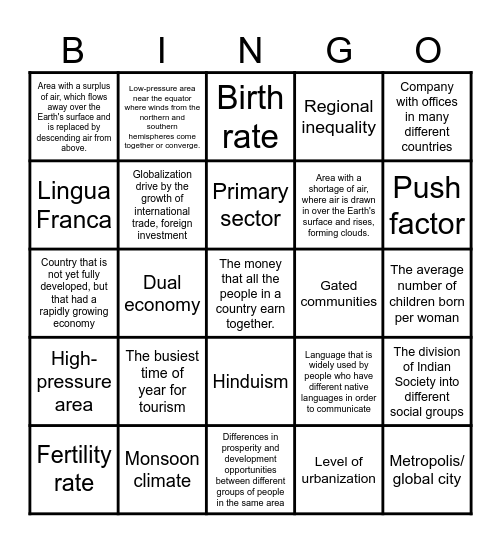

This bingo card has 113 words: BRICS, Demographic pressure, Core country, Periphery, Semi-periphery, Convectional rainfall, Regional inequality, Urbanization rate, Colony, Colonial power, Intertropical convergence zone (ITCZ), Economic Globalization, Informal sector, Federation, Federated state, Human Development Index (HDI), Hinduism, Caste system, Social inequality, Green pressure, Fertility rate, Birth rate, Monsoon, Low-pressure area, Relief rainfall, High-pressure area, Monsoon climate, Rain shadow, High season, Pull factor, Push factor, Primary sector, Dual economy, Emerging countries/ growing economy, Special economic zones (SEZ), Outsourcing, Globalization, Service sector/ tertiary sector, Development indicators, Brain drain, Migrant workers, Remittances, Self-sufficient, Monoculture, Gross Domestic Product (GDP), Support prices, Level of urbanization, Lingua Franca, Subsidy, Multinationals, Rural-urban migration, Gated communities, Urban agglomeration, Megacity, Middle class, Urbanization, Metropolis/ global city, Average number of births per 1000 people per year, When highly educated and skilled people leave their country of origin and move abroad, Name for a group of five major emerging economies, The division of Indian Society into different social groups, State that exercises control over a colony, Rain that occurs when air heats up, rises, and cools down again, Wealthy, highly developed country with great political and economic power, The relationship between productive and non-productive age groups, Tool for measuring prosperity and poverty in a country or region, A country with two economic sectors: one modern and highly developed, the other traditional and less developed, Globalization drive by the growth of international trade, foreign investment, Country that is not yet fully developed, but that had a rapidly growing economy, Region that is part of a country but has certain powers of self-government (own capital, laws), The average number of children born per woman, Residential areas surrounded by a high wall or fence, often heavily guarded, Continuing process of international exchange of people, goods, money and information, The pressure that the age group of those under 20 puts on the group 20-65, The introduction of better, faster-growing varieties of agricultural crops, combined with use of artificial fertilizers and pesticides, The money that all the people in a country earn together., The busiest time of year for tourism, Area with a surplus of air, which flows away over the Earth's surface and is replaced by descending air from above., Religion characterized by a belief in multiple gods and in rebirth after death., A score that shows a country's GNP per capita, life expectancy and literacy rate., Work in the service sector that is often unskilled, unregistered and poorly paid., Low-pressure area near the equator where winds from the northern and southern hemispheres come together or converge., Percentage of the population that lives in cities., Language that is widely used by people who have different native languages in order to communicate, Area with a shortage of air, where air is drawn in over the Earth's surface and rises, forming clouds., A city with more than 10 milion inhabitants, Very large city that plays an important role on a global scale when it come to the economy, culture and politics, Group of people where average incomes who are neither rich nor poor, Someone who goes to work somewhere else due to lack of work and money in their own area, Growing only one type of crop, Wind that changes direction every six months, Tropical climate with a short dry season, Company with offices in many different countries, When a company pays another company to take on part of its work, Low-income countries characterized by dependency, disadvantageous trade relations, lack of technology and low levels of production, Economic sector in which products are taken straight from nature, Reason that makes another region attractive to migrants, Reason to move away from a particular region, The leeward side of a mountain, where there is little to no precipitation, Differences in prosperity between various regions, Rain caused by air that rises against a mountain range, Money sent by migrants to family or friend in their home country, Migration from the countryside to the city, Able to meet your own needs., Countries that are neither rich nor poor: often emerging countries with a growing industrial sector., All businesses that provide services. Also called the tertiary sector., Differences in prosperity and development opportunities between different groups of people in the same area, Area where foreign companies can settle freely while paying little to no tax, Financial support given by the government to a person or institution, Minimum price that farmers are guranteed to receive for their products., A city with attached suburbs and towns., Increase in the percentage of the population that lives in cities caused by migration from rural to urban areas and The speed at which urbanization is increasing in an area..
Chapter 5 India | Chapter 5 India | Chapter 5 India | Unit 1 | Vocab
Share this URL with your players:
For more control of your online game, create a clone of this card first.
Learn how to conduct a bingo game.
With players vying for a you'll have to call about __ items before someone wins. There's a __% chance that a lucky player would win after calling __ items.
Tip: If you want your game to last longer (on average), add more unique words/images to it.